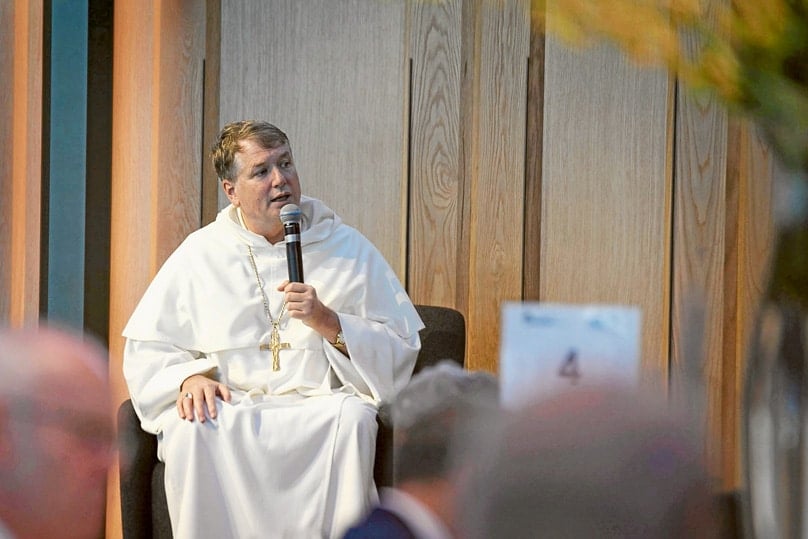
Imagine you’re an outsider, but curious about Christianity. Or that you’ve put your foot in the door, if not yet in the water, and are preparing for Baptism at Easter. What questions would be on your mind?
Following Brexit, the election of President Trump, and other seismic shifts in politics around the world, commentators are pondering the strength and future of democracy as we know it. There are many things one might say, but in the few minutes I have today I’d like to consider five challenges to democracy today, all of which have a spiritual dimension.
1. The emergence of a Fifth Estate in a polity of disrespect
Nowadays ‘Green-bans’ are a variety of Ray Ban sunglasses. But when I was a lad green bans were things imposed upon building sites by the Builders Labourers’ Federation (BLF). By 1975 the bans were said to have altered or delayed $5 billion of building projects – the equivalent of $25B in today’s prices. We can be grateful for the heritage buildings and parklands preserved while debating how we got that result.
Some at the time complained of corruption, claiming that some developers, with financial or other connections to the BLF or its officials, seemed to get a free pass while others were targeted. More often the complaint was that builders and developers should not be held to ransom by trade unions pressing social causes such as environmentalism, feminism, indigenous rights and the like; that it was for local councils to regulate and ultimately for parliaments (and those who elected them) to decide what kinds of development were permissible; and that unions should exercise their industrial muscle only in the interests of their members and only in the area of industrial relations, not across the whole gamut of social issues. A trade union official might prefer football stadia to opera houses, or vice versa, but he should not use union power to foist this preference upon developers or community. Trade unions, the critics said, are given certain recognition and privileges in our polity on the understanding that they do not use their power as if they were the Fifth Estate of government.
Fast forward from 1975 to 2017… Without consulting shareholders, and often without consulting their own Boards, some major corporations such as Qantas and Telstra have become major lobbyists for same-sex ‘marriage’, taking out full-page advertisements in national newspapers, and lending their corporate names, logos and funds to the campaign. ‘Marriage equality’-friendly CEOs are also pressuring the executives of other corporations to join them, and applying pink bans to companies and executives who do not.
Following lobbying of Price Waterhouse Coopers last year, senior executive Mark Allaby was forced to resign his board membership of the Australian Christian Lobby, apparently because of its traditional Christian position on marriage; he was then effectively hounded out of his job. On moving to IBM as managing partner he has again been targeted, this time for his association with the Lachlan Macquarie Institute, another Christian organisation that does not support ‘marriage equality’. The Coopers Ale company was also battered for being too friendly to the Bible Society. Qantas and Telstra employees now report bullying by executive staff to take part in supposedly optional LGBTI events and gay marriage lobbying. And through a strange alliance of corporate CEOs and social media trolls, pro-marriage organisations are denied hotel venues for their functions and their directors have been forced into hiding – from the public register at least.
The latest group to feel the heat from the corporate bosses – more than 20 of them, led again by the CEOs of Qantas and Telstra – are our political leaders; they, too, are being pressured to get on board with the same-sex marriage cause. The Prime Minister, Immigration Minister and Resources Minister all pushed back, reminding the CEOs of the limits to legitimate leveraging of corporate power.
Were such company bosses to revise Business Ethics 101, they might recall that:
• businesses are projects established for particular purposes (such as the provision of transport, telecom, banking or legal services) and rightly prosecute those purposes within the confines of law and ethics
• businesses should not use their commercial power to hold managers, employees, customers and the broader community to ransom on matters unrelated to the purposes of the business
• the CEOs and managers of corporations have additional responsibilities to shareholders to pursue only the proper purposes of the company and to maximise profits within reason from such pursuits
• they misuse their authority and thus their corporation’s and shareholders’ resources, when they pursue private social or moral ends distinct from those proper to their corporation
• in our polity corporations enjoy various privileges such as legal personality and perpetuity, limitation of liability, corporate tax rates, protections of intellectual property and bankruptcy law etc. on the understanding that they will use those advantages only for their well-understood commercial purposes, and not so as to become a Fifth Estate governing our democracy.
Whether the pink bans presage a move by corporate CEOs in Australia to become arbiters of other areas of moral and social policy is yet to be seen. But any arguments there are for their involvement in the marriage debate would probably apply to other social and moral issues were the CEOs so inclined. With their financial clout they can certainly clobber ordinary citizens, voluntary groupings and sometimes governments, who dare have a rival view to theirs. We need to recover respectful boundaries in our polity.

2. The need for courtesy amidst the politics of intolerance
I touched before on the campaign directed against the Coopers Ale company. Its particular crime was a very short video clip involving the former Human Rights Commissioner and prominent gay-rights activist, Tim Wilson MP, and the former SAS trooper also turned Liberal MP, Andrew Hastie, with the two debating same sex marriage over a Coopers Premium Light. As one commentator noted, their discussion is “a lesson in civility, a shining example of how two thoughtful friends can disagree respectfully, and maybe learn something from each other. And yet all hell broke loose.”
Following social media activism and threats of retail boycott by businesses, Coopers withdrew from its long-standing relationship with the Bible Society and took up sponsoring AME instead. In what Tim Wilson called a case of “the oppressed turning oppressor”, those who feel they’ve long been subjugated by churches or employers are now consumed by the politics of revenge.
This illustrates a second challenge to our democracy today: the inability to engage in courteous debate. Unlike other systems of government – monarchy, oligarchy, socialism or fascism – democracy needs courteous debate. If rival arguments can no longer be spoken or heard respectfully, if those with contrary interests or ideas can no longer be tolerated, then free and informed choice in government-making by voters and policy-making by MPs will not be possible. Neither electors nor elected will be open to persuasion, but moved only by bullying, bribery, loyalty groups or the like. Sadly, intimidation by the fourth and fifth Estates is increasingly corrupting contemporary polities.
A business network like this might reflect upon the implications for our economic democracy also. However cut-throat the free market may sometimes be, it relies upon and in turn sustains certain civilities and freedoms. Without some level of trust between business partners, or between shareholders and directors; or between bosses and workers, or with suppliers and customers; or between corporations and legal authorities; entrepreneurship and the free exercise of labour are undermined, and contracts and partnerships impossible. The future of our economic democracy is intertwined with that of our political and cultural democracy. If we lose the ability to have a civil discussion about what matters to us, all are put at risk. We need Christian courtesy amidst the politics of intolerance.
3. The need for faith amidst the politics of agnosticism
Many commentators on the history of modern (Western) democracy argue that it could not have taken the shape it has without its Judaeo-Christian underpinnings. One serious historian, Ernest Barker, even argued that the emerging forms of religious, university and civic government in 13th century Britain so influenced each other that Westminster democracy could not have taken the shape it did without the influence of the Dominican Order! Whatever of that, contemporary democracy is deeply influenced by beliefs about the dignity of the human person; the rule of law; human rights; separation of church and state; respect for the individual and conscience; and government for the common good – all of which are founded in the Scriptures and tradition of Christians. Since the Enlightenment some have sought post-Christian foundations for democracy but the jury is still out on whether agnostic liberalism will ever be enough to ground the democratic experiment. But I think it would be naïve to think a ‘live and let live’ attitude will be sufficient for dealing with the problems of a diverse community such as Australia’s in the future.
On another occasion I might say more about so-called ‘Australian values’, their Christian foundations, usefulness and limitations, and the challenges to those values in modernity. Suffice it here to say that when people talk about ‘shared values’ and what is ‘un-Australian’ this often reflects anxiety about the very lack of such common beliefs uniting them; the search can be for a kind of faith-lite or morality-lite that will do for now as a basis for dialogue and democracy; these may be exploited by some and written off by others as the mores of the benighted and ‘bogan’. But serious thought needs to be given to whether a thin and elitist conception of the good can as effectively underpin Australian democracy as the beliefs and practices that have done so till now. I would argue that we need Christian faith amongst the politics of agnosticism.

4. The need for hope amidst the politics of despair
The next contemporary deficit is of hope. Christian eschatology encourages living in the present but with an eye to the future, recognising the need to make sacrifices today for our individual and common good tomorrow, and recognising also that this world is not all there is. The Prime Minister’s recent proposal to enlarge the Snowy Mountains Scheme seems to me inspired by such a distant horizon, but I wonder if we will ever again embrace such a big project, given the forward thinking it would require; the commitment across multiple governments; and the sacrifice by the present generation for the benefit of some future one.
Contemporary politics finds it hard to look beyond the 24-hour news cycle, the weekly commentary cycle, the monthly opinion poll cycle, the annual party leadership cycle, and the three-year election cycle. This is by no means all the fault of our politicians: it reflects a culture in which people are unwilling to plan too far ahead, inclined to live on what remains of their inheritance from earlier generations, and disinclined to leave as much and as good (let alone more and better) for future generations. Few today build things that will last a century and more, let alone start things that will not be enjoyed until after they’ve gone. In our perpetual dissatisfaction with politics, we change our leaders so often that few can have an eye beyond the present three-year term, let alone three decades and more. What we need is Christian hope amongst the politics of despair.
5. A measure of charity amidst the politics of hate
Finally, we come to the deficit of charity in our contemporary polity. Politicians of various political hues have long appealed more to our fears and insecurities than our better nature. In debates about refugee intakes, for instance, they rarely unite a deep compassion for the desperate would-be newcomer to the sometimes reasonable, sometimes irrational, fear of ‘open gates’. Meanwhile the politics of envy and adversarialism mean everyone wants what others have got and each side seeks to obstruct the other’s progress. Our electors can be over-critical and over-polarised, inclined to change government at the drop of a hat. In a political culture so short on basic courtesy and beliefs, it might seem naïve to ask for a deeper and more patient charity.
Indeed, talk of self-sacrifice by anyone but soldiers, police and emergency workers can be political suicide in modern democracy. Politicians offer electors many lollies but rarely dare ask us to go without for the sake of the common good; if they do, we punish them. In the process we bequeath an enormous burden of debt to future generations. We are also failing to renew our social infrastructure of ideals, customs and institutional expressions of compassion-in-action. We need Christian love today amidst the politics of hate.
While praising much in modernity the Second Vatican Council identified ‘infamies’ that still poison human society, damage both victims and perpetrators, and supremely dishonour the Creator. It presciently identified modern slavery, including trafficking in women and children and the imposition of sexual, domestic and other servitude upon others, as one of the worst evils yet to be effectively abolished from human society. Pope Francis has been a tireless champion of this cause and the Catholic Church, along with other churches and faiths, is playing an ever-growing role in the international effort to stamp out human trafficking.
The New South Wales Parliament is now considering the problem and earlier this week I proposed to the Select Committee on Human Trafficking some measures our state might usefully take. But it is not enough for groups such as churches to lecture or exhort the rest of the community: we must demonstrate our own willingness to act where we can. So I announce today that the Archdiocese of Sydney will take the following practical measures:
1. We will review and revise all relevant contractual and business practice documentation, including the Archdiocese’s Guide for Business Practice, to highlight the Church’s commitment to eradicating human trafficking.
2. We will as far as possible only purchase slavery-proofed products and services, and as far as possible only contract with firms who certify that their goods are not tainted by human trafficking.
3. We will maintain a register of suppliers who have given such certification regarding their goods and services, and ensure that our chancery, parishes, schools, agencies and affiliates understand this new Archdiocesan policy.
4. We will establish an Archdiocesan Anti-slavery Taskforce with a mandate: to promote this new ethical procurement policy throughout the Archdiocese; to prepare resources and conduct programmes for the Catholic faithful and other people of good will about eradicating human trafficking; to devote energies of the Archdiocesan Office of Justice and Peace, parishes, schools and other agencies to educate and campaign to end human trafficking; and to partner with and support the work of Australian Catholic Religious Against Trafficking in Humans and other organisations, particularly in their mission to assist victims of human trafficking.
5. We will work with other dioceses and congregations of the Catholic Church, with leaders of Catholic education, health and aged care and welfare services, with our international Church contacts, with leaders and agencies of other churches and religions, with our friends in the business and labour sectors, and with the civic authorities, to support each other’s efforts to eradicate human trafficking.
This will be a tangible expression of faith, hope and compassion-in-action in public life. There should be many more.
Conclusion
Resilient as modern democratic polities and economies have proven to be, I believe their future depends on reclaiming a place for respect, courtesy, faith, hope and charity. The effort to stamp out modern slavery in this generation seems to me a good example of something churches, businesses, politicians and the wider community might do together if they share such principles and virtues. Unlike the green and pink bans, this would not require any of those organisations to act beyond their proper purposes and their responsibility to achieve those purposes within the confines of law and ethics. But in the process this would serve to strengthen our social capital by reaffirming and restating our commitment to our deepest values and commitments.
This is the edited text of the address by Archbishop Anthony Fisher OP at the Sydney Catholic Business Network, Hyatt Regency Hotel, Sydney, on 31 March 2017.
